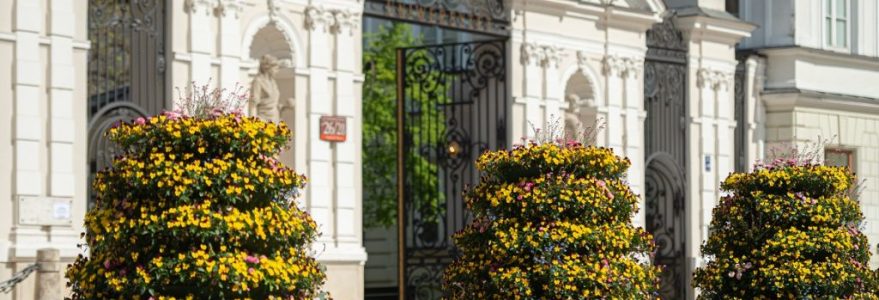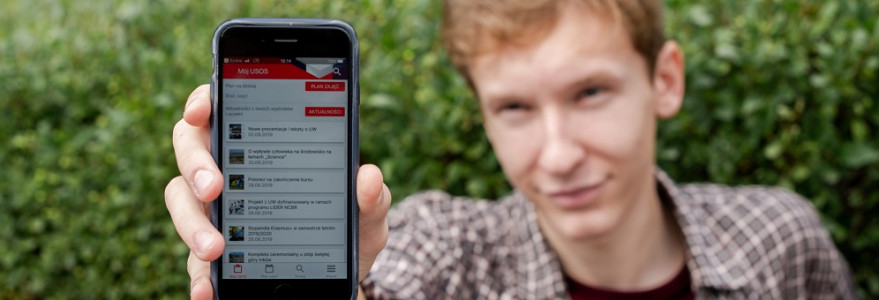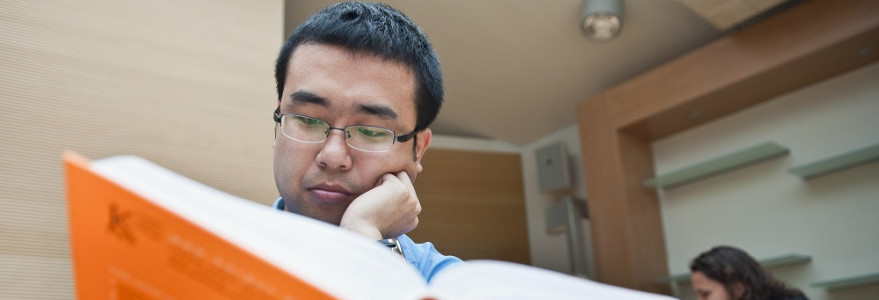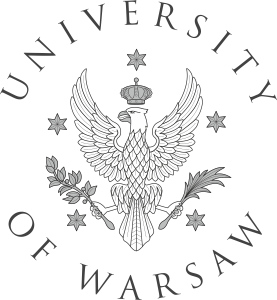
Open position for PhD student in BioInspireSensing project
29 marca 2021 BioInspireSensing is offering three-year fellowships starting in the 2021 academic year and funded by the ITN – Marie Skłodowska-Curie Actions call of the European Commission. We are now looking for highly motivated Early Stage Researchers (ESR) to work their PhDs in the following research projects:
BioInspireSensing is offering three-year fellowships starting in the 2021 academic year and funded by the ITN – Marie Skłodowska-Curie Actions call of the European Commission. We are now looking for highly motivated Early Stage Researchers (ESR) to work their PhDs in the following research projects:
„Structural and functional characterization of ion channels embedded in planar lipid bilayers”
Recruiting institution: University of Warsaw (UW)
Location: Warsaw, Poland
Supervisor: Sławomir Sęk
For more details and application see:
https://www.bioinspiresensing.eu/recruitment/applicationesr08
Expected start day: October 1st, 2021
Suspension of classes conducted in contact
25 marca 2021Dear Colleagues,
Academic Teachers and Students,
due to the epidemic situation, in agreement with the Dean of the Faculty, Prof. Andrzej Kudelski, I have decided to suspend the contact classes (laboratories) from 29.03.2021 to 02.04.2021.
Only classes conducted as part of the diploma laboratories will be allowed to take place stationary, maintaining the sanitary regime.
I would like to inform you that classes for the Nanostructures Engineering held at the Department of Chemistry for students of the Physics Department will be canceled by a separate decision of the Vice-Dean Dr. Krzysztof Turzynski, prof.
With best wishes for good health
Prof. Dr. Beata Krasnodębska-Ostręga
Announcement for the position of Assistant
24 marca 2021The Dean of the Faculty of Chemistry announce a competition for the position of Assistant (Asystent) in a group of research and teaching staff. Available positions: 3. Deadline for applications: 12 May 2021, 14:00. For more info see >> pdf
Announcement for the position of Assistant Professor
The Dean of the Faculty of Chemistry announce a competition for the position of Assistant Professor (Adiunkt) in a group of research and teaching staff. Available positions: 4. Deadline for applications: 12 May 2021, 14:00. For more info see >> pdf
UW and its operation as of 20th March
23 marca 2021The Rector of the University of Warsaw has issued an ordinance on the operation of UW in the state of the epidemic, announced as of 20th March 2021. The document published on 19th March 2021, changes § 17a included in Rector’s ordinance No. 217, issued on 29th September 2020.
As of 20th March 2021, until further notice, classes conducted as part of the 1st, 2nd and long-cycle study programmes, doctoral studies, programmes in doctoral schools, postgraduate studies, and as part of courses and trainings are held by, as per UW Rector’s regulation No. 9 of 18th January 2021. All exams, diploma work defences, and PE classes will be held on a remote basis. It is advised to perform work remotely. While working on-site, not more than one employee should be present in a room. Meetings of collective bodies will also take place online. UW library collections will be made available only in a non-contact form.
Guidelines on UW operation as of 20th March 2021
ORGANISATION OF EDUCATION
- Classes being part of the 1st, 2nd and long-cycle study programmes, doctoral studies, programmes in doctoral schools, postgraduate studies, and courses and trainings are conducted online, according to the UW Rector’s regulation No. 9 of 18th January 2021.
SPORTS ACTIVITIES
- PE classes will take place only online,
- Sports activities performed by the University Club of the Academic Sports Association can take place in UW facilities provided that the director will provide their consent. All the hygienic and sanitary conditions must be satisfied.
OPERATION OF LIBRARIES
- Libraries make their collections accessible to users, complying with sanitary and hygienic requirements if there are technical possibilities. Libraries operate in self-service mode.
MEETINGS OF UW BODIES AND COLLECTIVE ENTITIES
- Meetings of the bodies and collective entities of the University of Warsaw and other bodies may take place only remotely.
DEFENCES / DOCTORAL EXAMINATIONS
- Doctoral examinations in proceedings of awarding the doctoral degree instituted by 30th April 2019, defences of doctoral dissertations and habilitation colloquia will be conducted only remotely.
WORK AT UW
- If there are no justified circumstances against, heads recommend their employees to work remotely,
- There may be a maximum of one employee working in a given room at the same time,
- The number of people staying in one room at the same time should not exceed one person per desk.
View the ordinance (in Polish) >>
Source: www.en.uw.edu.pl
Seminar CeNT 26.03.2021
22 marca 2021The Centre of New Technologies invites to a webinar by
prof. Krzysztof Woźniak, Tomasz Góral, PhD,
Centre of New Technologies, University of Warsaw
Title: Cryomicroscopy and Electron Diffraction Core Facility at CeNT UW
Date: 26th March 2021 (Friday)
Time: 12:00 pm (Central European Time)
Host: prof. Joanna Trylska
Virtual seminar: https://us02web.zoom.us/j/88617105727
Meeting ID: 886 1710 5727
To subscribe to receive announcements about CeNT UW seminars or to unsubscribe please click here
CeNT-UW-Webinars-instruction-for-attendees
Abstract:
CryoEM (cryo-electron microscopy) is a Nobel Prize-winning technique that revolutionised structural biology, accelerating progress in medicine, pharmacy, biology and biochemistry. This versatile method involves vitrification of samples in their native state by plunge freezing followed by imaging with a high-end transmission electron microscope (TEM) under cryogenic conditions. Since the „resolution revolution” (~2013), major breakthroughs in hardware and software such as more sensitive cameras and sophisticated data processing algorithms have transformed EM images into high-resolution molecular structures. Modern CryoEM microscopes equipped with the newest energy filters can yield atomic-level structures even close to 1 Å resolution (Nakane et al., 2020), often published in top journals such as Nature or Science.
In 2019 the University of Warsaw purchased and installed one of the first fully dedicated Cryo-TEM instruments in the country: 200kV Glacios (Thermo Fisher Scientific), located at CeNT UW in the Cryomicroscopy and Electron Diffraction Core Facility. The instrument is equipped with an autoloader holding up to 12 grids, a CCD Ceta16M camera, a direct electron detector camera Falcon3EC and a phase plate for contrast improvement. Such configuration allows currently for two major cryoEM modalities i.e. single particle analysis (SPA) and cryo-tomography (CryoET).
In this webinar we introduce the Cryomicroscopy and Electron Diffraction Core Facility at CeNT UW and discuss its current research possibilities. We also show our plans for further development including upgrade to micro electron diffraction (microED) together with a dedicated infrastructure for cryoEM data storage and processing.
Over 12 000 UW students with eID cards
19 marca 2021
More than 12 000 students of the University of Warsaw already use their eID cards (“mLegitymacja”). With the mobile version of the document, students can confirm their student status and benefit from statutory discounts.
“mLegitymacja” is a mobile version of a student card confirming the student status and entitling students to benefit from discounts. Student card service is carried out without the participation of the university administration. Students can order, extend and revoke their eID cards through the USOS Mobile app and USOSweb.
Its operation is possible thanks to the “mObywatel” application, after integrating the system with the mobile application USOS. Detailed information and installation instructions can be found on the USOS website, the USOS Mobile app and the mObywatel app.
Reinstall
To reinstall a student electronic ID card on a new device, go to “mLegitymacja” on the USOS website or to the USOS Mobile app and select “Revoke mLegitymacja”. This feature is also useful if the activation code was ordered some time ago and the “mObywatel” application indicates an error with the text: “mLegitymacja does not exist”.
There is no need to visit the university in person in order to activate, renew or revoke student electronic ID cards.
The mobile student ID card is the full-fledged equivalent of a plastic student card. However, having a traditional version of the document is still an obligation. Electronic ID cards have a complementary function.
The validity of electronic student ID cards has been extended in USOS from 31.01.2021 and 31.03.2021 to 30.06.2021.
Source: www.en.uw.edu.pl
Six lectures on multilingualism

In March and April, experts in the field of multilingualism will present multilingualism from the linguistic, psycholinguistic and educational perspectives. The online six-lecture series begins on 24th March.
In the series of six lectures, “Current trends in multilingualism research”, researchers will present linguistic, cognitive, affective and educational aspects of multilingualism. International experts will discuss the findings of empirical research on individual multilingualism. Specialists will explain the mechanisms which underlie the functioning of multilingual adults and children. Also, they will discuss individual differences in the acquisition of new languages, expressing emotions in foreign languages, multilingualism in education, as well as linguistic and cognitive development of multilingual children.
The lectures are organised by the University of Warsaw School for International Science, in collaboration with the International Association of Multilingualism under the Initiative of Excellence – Research University project (IDUB Action II 3.7 “Multilingualism”), coordinated by Prof. Agnieszka Otwinowska-Kasztelanic from the UW Faculty of Modern Languages.
Languages in everyday use
Multilingualism refers to the usage of several languages by the same person for varied purposes.
A multilingual person is defined neither through the prism of the order of the languages learned, nor the proficiency in those, but functionally, as the ability to use those languages on daily bases,” explains Prof. Agnieszka Otwinowska.
Multilingualism, defined in that way, is common in modern societies, including Poland, as many people develop multilingually due to international mobility, migration or schooling. On the one hand, multilingualism is an opportunity, and on the other, it is a challenge and responsibility, especially for teachers working with multilingual children and youth.
The programme of the lectures
All six lectures will begin at 3 p.m. on YouTube (the UW Live Stream profile). The meetings will be conducted in English.
- 24th March, Prof. Raphael Berthele (University of Fribourg, Institute of Multilingualism): Between monolingual bias and the celebration of diversity: Investigating individual differences in multilingual acquisition
- 31st March, Prof. Jean-Marc Dewaele (Birkbeck, University of London): Communicating emotions in a foreign language: the ultimate linguistic challenge
- 15th April, Prof. Jasone Cenoz (University of the Basque Country): Focus on multilingualism and translanguaging in education
- 21st April, Prof. Julia Festman (University College for Teacher Education Tyrol): Does it get any easier when we learn and process multiple languages?
- 22nd April, Prof. Magdalena Wrembel (Faculty of English, Adam Mickiewicz University): Exploring the acquisition of L3 phonology: challenges, new insights and future perspectives
- 29th April, Prof. Ewa Haman (Faculty of Psychology, University of Warsaw): Multilingual children: developmental opportunities and challenges
Multilingualism at individual, social and cultural level is also one of the main themes of the 4EU+ Alliance, to which the University of Warsaw belongs.
Source: www.en.uw.edu.pl
Seminar CeNT 19.03.2021
15 marca 2021The Centre of New Technologies invites to a webinar by
Danijela Popovic, PhD,
Centre of New Technologies, University of Warsaw
Title: Ancient genomes reveal long range influence of the site and culture of Tiwanaku
Date: 19th March 2021 (Friday)
Time: 12:00 pm (Central European Time)
Host: prof. Joanna Trylska
Virtual seminar: https://us02web.zoom.us/j/81927654827
Meeting ID: 819 2765 4827
To subscribe to receive announcements about CeNT UW seminars or to unsubscribe please click here
CeNT-UW-Webinars-instruction-for-attendees
Abstract:
Tiwanaku was a civilization that flourished in the Lake Titicaca Basin (present-day Bolivia) between 500 and 1000 CE. At its apogee, Tiwanaku controlled the lake’s southern shores and influenced certain areas of the Southern Andes. There is a considerable amount of archaeological and anthropological data concerning the Tiwanaku culture; however, our understanding of the population of the site of Tiwanaku is limited. To understand the population dynamics at different stages of the Tiwanaku cultural development, we analyzed 17 low-coverage genomes from individuals dated between 300 and 1500 CE. We found that the population from the Lake Titicaca Basin remained genetically unchanged throughout more than 1200 years, indicating that significant cultural and political changes were not associated with large scale population movements. In contrast, individuals excavated from Tiwanaku’s ritual core were highly heterogeneous, some with genetic ancestry from as far away as the Amazon, supporting the proposition of foreign presence at the site. However, mixed-ancestry individuals’ presence suggests they were local descendants of incomers from afar rather than captives or visiting pilgrims. A number of human offerings from the Akapana Platform dating to ca. 950 CE mark the end of active construction and maintenance of the monumental core and the wane of Tiwanaku culture.
An announcement for student position
Project Manager – dr Anna Kajetanowicz (Organometallic Synthesis Laboratory, Biological and Chemical Research Centre, Faculty of Chemistry, University of Warsaw) is looking for a candidate to work in a scientific project: „Synthesis of ruthenium complexes bearing CAAC ligands and their use in metathesis reactions” programme Opus supported by National Science Centre position: Student (1). Deadline for applications: 28 March 2021. For more info see >> pdf

